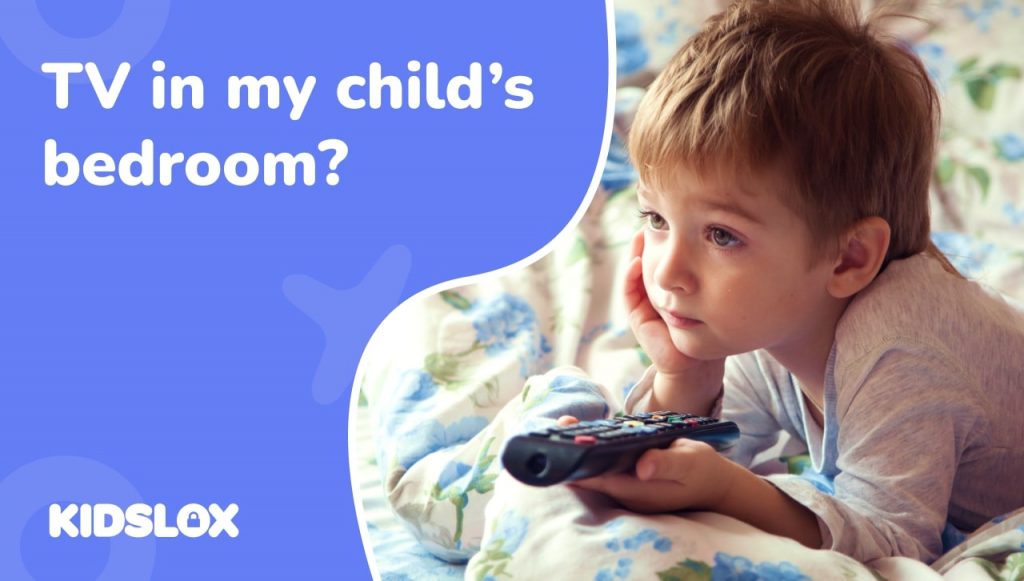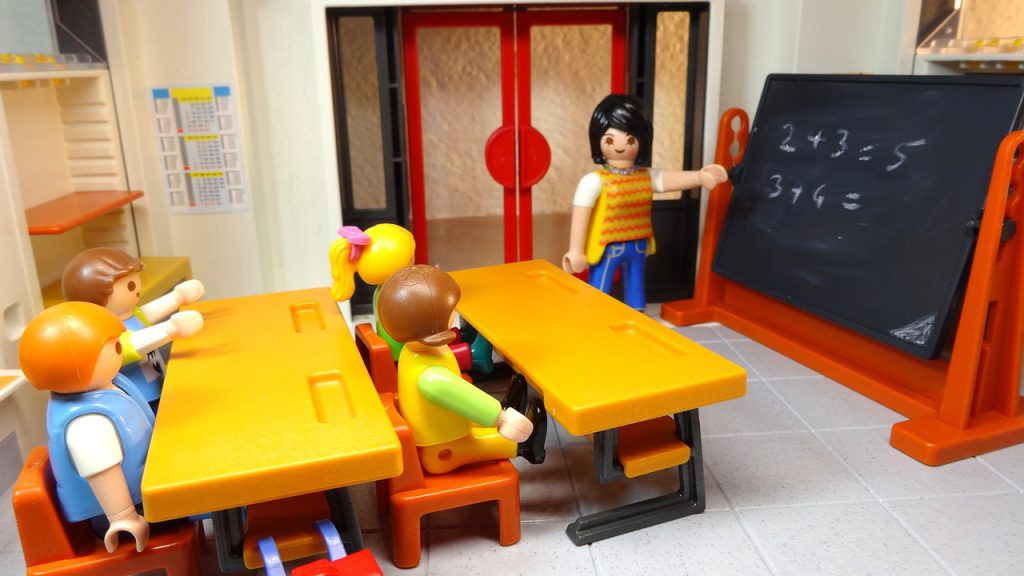From bad health to bad habits, we explore why children’s bedrooms don’t need a television, and are best kept for sleeping
It’s not unusual for parents to consider buying a TV in their child’s bedroom – especially if it’s something the child has been asking for. In fact, The New York Times estimates that up to half of American children have a television in their bedroom, making it a common and widely adopted practice in a lot of households.
Did you grow up with a TV in your room? As an 80s baby, I remember the Christmas I received my first television (those days they had an in-built video player). I also remember the scramble for the remote as I heard my parents coming up the stairs to check if I was watching well past my bedtime! (Spoiler alert: of course I was!).
The concept of having a TV in the teenage – and often younger- bedroom is nothing new, but the potentially damaging consequences they can have on children’s health and development are being discussed more than ever. It might be common practice, but is it a good idea? What are the pros and cons of your child having a TV in their bedroom?
Constant arguments about what different family members want to watch. Annoying pinging of video games and sing-song voices of children’s television taking up too much space in your home. Sound familiar? You might think that giving a child their own set is a great way to put a stop to the bickering and get some much needed peace and quiet.
But, think carefully – there are lots of reasons why putting a set in their personal space might actually be a really bad idea. Let’s explore more…
Ten reasons why you shouldn’t put a TV in your child’s bedroom.
1. Research suggests there are negative health outcomes associated with bedroom TVs
Poor physical fitness, social relationships and mental health were all associated with children who had a TV screen in the bedroom at the age of four. In a North American study of 2,000 children, it was shown that pre-schoolers with sets in their rooms were more likely to have a larger body mass index, unhealthier eating habits, higher levels of emotional distress and were more likely to be physically aggressive. This was still the case when existing familial and existing factors that typically denote these behaviors were taken into account.
Not a positive start for the idea of TVs in children’s rooms.
Experts agree that under the age of two, children shouldn’t have any screen time at all. After that, and up to the age of 12, it’s recommended that they have only one hour of viewing a day. For children on the younger end of that spectrum, that time should also be supervised.
Putting a TV in a child’s bedroom dramatically increases the likelihood of them going over those thresholds. And, by giving them too much access to the screen, you take away some of the control and guardianship you have over what they’re watching.
While letting children watch something while you’re busy trying to complete chores or work is one of the undoubted benefits of having the TV handy, it’s not always easy to strike the right balance. Children’s programmes are colorful, distracting and highly entertaining – making them a lot more appealing than doing ‘real world’ things like games, tidying up and eating dinner! Too much time watching TV can impact on your child’s behavior and end up creating a vicious cycle of them demanding more with you giving in to stop the tantrums.
If you’re concerned, that your child is watching too much television, especially younger children like toddlers, some of the signs that they need to cut back include:
- They sleep poorly and are difficult to get to bed when it’s time for light out
- They don’t appear to listen to you and have poor concentration
- They’re not hitting language milestones. There’s no substitute for talking to your child!
- They’re displaying aggressive behaviors over and above typical toddler tantrums
- They’re being demanding for things – begging for new toys and other things they’ve seen on screen
- They have attitude with you
.
2. TVs are terrible for sleep
If you’re concerned about your child getting quality shut-eye, avoiding a TV in the bedroom is a must. The effects of watching TV before bed are well documented, including difficulty falling asleep and disruptions to sleep cycles once you manage to drift off. This is especially true if your child ends up falling asleep with the TV on – a likely occurrence if they’re watching it when you think they’ve gone to bed. Sleeping with the TV on disrupts the body’s natural melatonin production, and over-stimulates the brain, (which rests and recuperates along with the rest of your body while you sleep), and can have long-term health implications for your child.
If your child has a set in their room, it can encourage staying up way past bedtime, and provide a distractive presence. Bedrooms should be for sleep, relaxation, play and homework only to make the most functional use of the space.
3. It’s harder to monitor the time they’re spending in front of a screen
We know that it’s not a good idea to let our kids spend hours fixed to their screens, and having one in the bedroom increases the likelihood that they’ll be watching around the clock. Even passive viewing counts towards the total amount of hours they’re exposed to the screen, distracting them from concentrating on educational, social and family-interaction time.
When kids slope off to their bedrooms and you’re caught up in important daily tasks, the temptation of the TV is always going to be there in their room. Keeping the screens to communal areas means that the children have to share the remote, and you’re always around the monitor what it is that they’re actually up to.
4. And what they’re watching too
Out of sight means that you don’t have a view on what they’re watching. And, without your prying eyes, there’s the temptation for kids to seek out (and stumble across) inappropriate content. Late night viewing after lights out makes this even more likely too. If you’re concerned about what your child is watching and don’t want them exposed to violent shows and other adult content, keeping the TV out of the bedroom is the most straightforward way of stopping that happening.
5. Another screen = another cost
Everyone is feeling the pinch with energy bills at the moment, and adding another screen to the house increases the amount of electrical devices on the go. Even when they’re switched off, TVs in standby mode can account for up to 10% of your overall energy bill. Limiting the amount of screens around your home is not only good for your bank account, it helps protect the environment too.
6. A major distraction
With the lure of the TV glowing like a beacon on the bedroom wall, even the most enthusiastic of bookworms can find it hard to focus on their studies or reading an enriching story.
Even passive viewing can provide a distraction when your child should be doing something important, like their homework! In fact, research shows that having a TV in the bedroom is associated with lower grades. According to a study by Iowa State University, location is everything. Children who took part and had a TV in their bedrooms read and slept less and watched and played more violent shows and video games.
A combination of the television’s tendency to result in poorer sleep quality and take away time from reading and homework isn’t a great combination for scholastic achievement. Both are associated with having a screen in the bedroom.
7. And it’s not just TV…
A screen in the bedroom isn’t just a platform for cartoons and other shows, many kids use them for video games. Too much time spent gaming has widely reported negative implications for children’s health. Greater incidences of aggression, depression and social isolation have all been associated with over-gaming, and experts are concerned about the growing numbers of young people suffering from video game addiction. Having a TV screen in the bedroom where children can game without restrictions can increase the likelihood of them spending much more time than what is recommended
8. Bad health and bad habits
In a study of 700 middle schoolers (aged 12-14), researchers found a shocking pattern between those with a TV in their bedroom and likelihood of smoking. Taking out factors, including having peers, or parents that smoked, these teens were still more likely to take up the unhealthy habit than those who didn’t have a screen in their personal space. Amongst the children with a TV in their bedroom, 42% smoked in contrast to just 16% of the teens without TVs.
Televisions in children’s bedrooms also encourage sedentary behaviors and habits. Children need at least an hour or moderate to vigorous physical activity a day. If they’re spending long hours at their desks in school, then coming home to hide out in their rooms to watch shows and play video games, that’s a recipe for bad health and obesity.
9. Less family time
If you’re struggling to get your child or teen to spend more time with you as a family, the temptation of the TV screen in their bedroom could prove too much to ignore. Imagine you have family or friends over, and you’d like your teen to get involved with games, socialize with relatives they haven’t seen, and simply take part in the day. But they’ve got other ideas. The next episode of their favorite show is out and they want to watch it. The arguing starts and you’ll do anything to avoid a scene. It’s a common theme that happens across households – by removing the TV from the bedroom, it’s one less argument and one less distraction from the things that really matter to your family, like spending time together!
10. It encourages isolating
Teenagers crave their personal space and privacy, and that’s no bad thing. It’s important that children are given the opportunity to set their own boundaries and be comfortable in their own company, but 24/7 access to their own TV screen can encourage those with more introverted tendencies to isolate more.
If your teen is more comfortable being alone and finds it hard to socialize, or actively avoids family time, having TV on tap can become another block to getting out and in the company of others.
Conclusion: should I put a TV in my child’s bedroom or not?
Unlike their phones and ipads, it’s hard to turn a TV in at night. If you have digital rules and cellphone contracts at home, you can ask your teen to put the device down for the night, but taking down a wall mounted TV? Not going to happen!
On balance, the cons of having a TV in your child’s bedroom outweigh the pros of convenience and choosing their own shows and leisure time. Once the set is in there, it’s difficult to remove and is likely to cause major arguments if you try and take it away.
The major take-out is that a television in your child’s room has the potential to encourage too many unhealthy behaviors and habits that can outweigh any positives. Temptation to sit staring at the screen and not moving can result in poor health outcomes, including obesity. Access to video games and favorite shows can distract from important things like homework and discourage reading. TVs in bedrooms and watching TV before bed is also associated with poor sleep, and most children need at least ten hours a night to help their developing brains and bodies reach their full potential.
Keeping the bedroom for sleep, play and homework is the most balanced approach, leaving screen time for the appropriate times, making it easier for parents to manage and keep a track of what, and how much, children are viewing.





